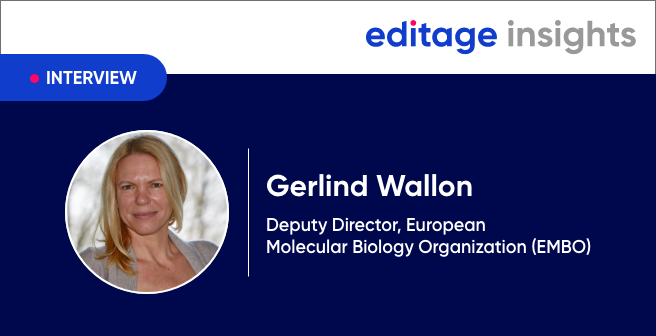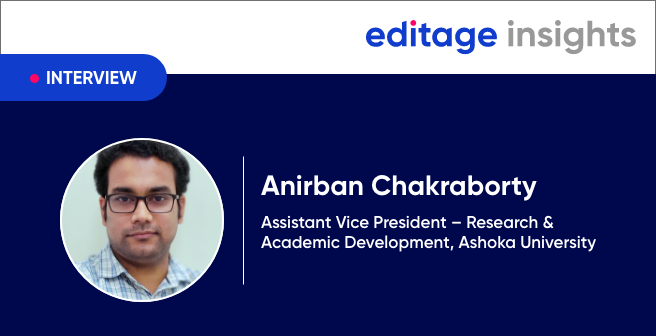Evaluating research methodology, studying the literature, and innovating – Tips from an expert

When you meet a scientist who is an outspoken individual, passionate researcher, prolific author, and experienced supervisor, the conversation is bound to be interesting! In this interview with Editage Insights, Dr. Xuejun Sun, an eminent researcher in hyperbaric oxygen studies, delves into the minutiae of academic research and publishing from the perspectives of a supervisor and a researcher. Choosing a research question, coming up with potential research ideas, identifying high-potential concepts, and a disciplined approach to reading up literature are some of the areas he discusses.
Dr. Sun, a world leading researcher in hydrogen and hyperbaric oxygen studies, has published 200+ peer reviewed papers about the effect of oxygen, hydrogen, and helium on disease injury protection. He is also associated with more than 10 international biomedicine journals as peer reviewer and has reviewed hundreds of papers. Dr. Sun joined the Springer journal Medical Gas Research as Associate Editor in 2011. He has extensive experience in literature reviews, research project designing, and manuscript writing. Dr. Sun is also a guest contributor to Editage Insights.
Dr. Sun, you have published over 200 academic journal articles. You have been quite prolific. Could you share your experience with authors who are looking to get published in international journals and get recognized for their work?
It is true that I may have published more articles than most researchers but I must emphasize that the quantity of articles cannot be compared to their academic quality. Irrespective of how many articles you publish, you have to ensure that each paper is of the highest quality. I don’t think that my publication record should be considered exemplary solely because of the number of publications I have to my credit. That would send across the wrong message. There are two main reasons for my prolific record. As a supervisor, my name gets included in the articles authored by my students. Another factor is my association with research organizations. When I work with them on a research project, they include me as a co-author based on the extent of my contribution to the research.
So I could say that being a co-author worked to my advantage. I would advice authors who are collaborating with others on a research project/paper to be open. Avoid keeping your expertise or ideas to yourself. There is no point to scientific collaboration if you are not facilitating a two-way exchange of knowledge.
As a supervisor, what aspects of your students’ work did you focus on?
When dealing with students involved in scientific research, helping them get published is only part of a supervisor’s job. The biggest responsibility is to guide students to develop the necessary skills to carry out scientific research independently. In biomedical research, experimental study is a more widely used methodology, and a supervisor in this field will need to help his or her students become capable of independently conducting experimental studies.
As a supervisor I also have to help students look for newer ideas. I encourage my students to read existing literature in their field or to participate in academic discussions. By exposing themselves to previously conducted research or by interacting with fellow researchers or experts, they will naturally start thinking of new avenues of research in their field.
Another skill I have to help my students develop is that of evaluating scientific research methodology. To help my students in this area, I get them voice their ideas freely, discuss and analyze those ideas, and identify the most interesting elements in each. Even though all their ideas may not be ready for implementation, I encourage students to develop and perhaps publish them as theoretical articles. Such articles account for a sizeable proportion of papers published by my students. If an idea has potential for implementation, it should be analyzed in detail. I let my students take the lead and develop their ideas as research experiments. Once this is done, relevant technical support can be mobilized to help them get started as quickly as possible.
I have always told my students to grab the opportunity to be the first to publish a good idea. If your effort to develop an idea is unsuccessful, don’t give up. Revising the research approach or improving the design may lead to success eventually. In short, although writing articles should not be viewed as the goal of a research career, it can be a way to summarize your research ideas and process. Writing and publishing articles are routine aspects of academic research. After all publishing articles is an important way to present scientific research.
You probably have a very busy schedule. Apart from handling your own research projects and administrative work, you engage in academic exchange activities and supervise students. How do you find the time to stay updated about your field? Are there any specific reading habits that you would recommend to our readers?
To conduct scientific research, one must read a large amount of literature. First, you must read literature that is highly relevant to your research, and this should be part of your daily routine. For example, I mainly work on the biological effects of various noble gases. I make it a point to read up almost all the literature in this field because I know that there aren’t many in this research area.
Second, read literature that is somewhat relevant to your research topic, e.g., articles with a general approach or those that report any significant progress in the field. For instance, my research on hydrogen effects is related to oxidative stress, so I read up general articles about oxidative stress and those published in high-quality journals, such as Free Radical Biology and Medicine, in detail. This helps me increase my understanding of my research area.
Finally, read up on trending research topics, such as the latest literature and technological news related to stem cell research, non-coding RNA, epigenetics, and gut microbiota. Reading such literature will bring you up to speed with the current global trends in scientific research. You may likely get inspiration from some of these studies!
Do you make use of any tools to read literature? Or do you access journal websites or repositories hosted online?
To access my must-read literature, I mainly use search tools and their recommendation feature. I specifically prefer Medline and Google Scholar to stay updated about recently published literature in my field. Another option is to subscribe to weekly or monthly alerts. To stay abreast of the literature in related fields, I mainly run searches in databases using keywords. For increasing my awareness of trending research topics, I read up articles directly from the websites of leading international journals such as Nature, Science, and Cell.
There is so much literature out there. We can’t possibly read every article in detail. How do you decide which ones to spend more time on and which ones to skim through?
Because of the large amount of literature out there, you must choose to read extensively or lightly based on how relevant the articles are to you. The purpose of intensive reading is to understand the topic better while that of extensive reading to acquire rich and comprehensive information. Intensive reading does not imply reading every line. The key is to think about what you are reading. Focus on the critical parts of the reading material, identify potential ideas or aspects that interest you, e.g., the research design or methodology. Usually, I pay more attention to the ideas and study design in a paper. I also have a habit of directing my students to noteworthy research papers, asking them to examine and discuss the research methodology in these papers. To follow trending research topics, I mostly read abstracts and reviews. I also find that reading up about research results helps me gain insights into the significance of the research.
Over the years, I have developed another rather peculiar habit. I tend to translate all the English-language literature that I find interesting/relevant into Chinese, based on my understanding. My translations include my review of the research. I find this method to be highly effective. I find that the process of translation helps me retain the information in memory for longer as well as increases my understanding of the research. This process was time consuming at first, but eventually I found that my reading and writing abilities improved. You don’t have to translate every sentence. Consider listing salient features based on your understanding.
To a great extent, scientific research and publication involve innovation. How do you manage to always be innovative when it comes to your research topics?
This is an interesting question. I feel that to choose innovative research topics researchers must know how to find ideas and how to identify the good ideas from the bad. I must clarify that good and bad are relative to the research focus. An idea may be bad because it may not work for you at that point in time.
Seeking ideas or finding a suitable research question is a critical stage in the scientific research process. Discovering gaps in scientific research is not difficult. In fact, some of the gaps you spot my actually be complex research questions and working on them without a carefully planned approach may not yield any results at all. In my experience, complicated research questions need complex experiments or elaborate research methodologies. But there are some problems that are less complex. You may come across them during your research work. Or, they may occur to you when reading related literature, listening to presentations, or talking about them to your peers or seniors. And these problems are often the main ways to find research ideas. Consider, for example, that during literature reading, you have just learned that a molecule or cell was considered to play a very important role in the immune system. This could lead you to think about a molecule from the perspective of disease treatment and examine whether it could help diagnose or treat a particular disease. Here’s another example. When you see other scholars using a particular type of medical treatment or drug to treat cardiac ischemia, you may want to study this further to determine whether it can be used to treat ischemic attack.
Some students claim that they can come up with multiple research ideas daily, but struggle because they lack the support or guidance necessary to execute their ideas. Some students think that their ideas are not novel. Coming up with and looking for scientific research ideas are not difficult. The key is understanding whether the your ideas are worthy of being researched, or being able to tell the good ideas from the bad. I believe that a good research question should have three characteristics: novelty, reasonableness, and verifiability. If your idea has all three, waste no time and go for it. If you are still struggling, approach your supervisor for guidance. That’s what we are here for!
Thank you, Dr. Sun!
This interview was conducted by Deborah Yang.




